The black victims honoured in Naomi Osaka's US Open masks
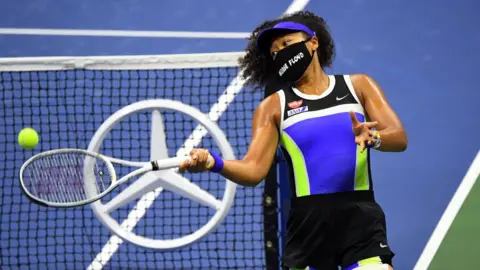 Reuters
ReutersNaomi Osaka has been making a statement with her face coverings while competing in the US Open: for every round, she wears a new mask bearing the name of a black victim of alleged police or racist violence in the US.
The Japanese tennis star made the pledge at the start of the tournament. Now, she's reached the semi-finals.
The families of some of these victims have publicly thanked her for wearing the masks, recording video messages which were played for her on the set of sports broadcaster ESPN.
Osaka said the messages left her "really grateful and... really humbled".
"I was just trying really hard not to cry," she told a press conference. "It's a bit surreal. It's extremely touching that they would feel touched by what I'm doing. For me, I feel like what I've been doing is nothing. It's a speck of what I could be doing."
Osaka has worn masks bearing the names of Breonna Taylor, Elijah McClain, Ahmaud Arbery, Trayvon Martin and George Floyd. These are their stories.
Breonna Taylor
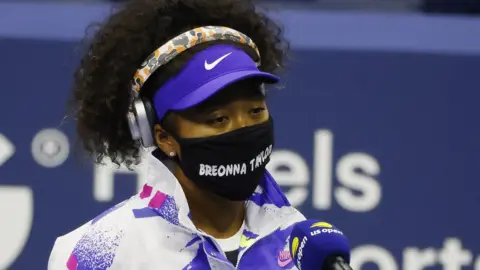 EPA
EPAOn 13 March, police officers in Louisville, Kentucky, used a battering ram to break down the door to Breonna Taylor's apartment.
They suspected her flat in the city's South End was being used to receive drugs by a gang based at a different address about 10 miles (16km) away.
One of the suspects was an ex-boyfriend of hers, and she was one of three people named on the warrant, local media reported earlier this year. She was not the main subject of the investigation.
But breaking down her door triggered a chaotic series of events and a barrage of police gunfire that left Ms Taylor - an unarmed, 26-year-old emergency medical technician - fatally shot.
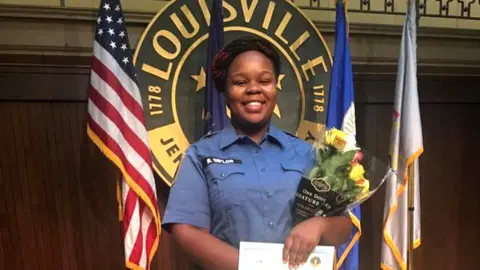 Facebook
FacebookMs Taylor's name, and a call to "arrest the cops that killed Breonna Taylor", became a rallying cry for justice in this summer's global Black Lives Matter protests.
In June Brett Hankison, one of three officers involved in the shooting, lost his badge. Louisville Police interim chief Robert Schroeder said his conduct that evening was "a shock to the conscience", and accused him of "blindly" firing 10 rounds into Ms Taylor's apartment.
Attorneys for Ms Taylor's family said at the time that they wanted to see the other officers - Jon Mattingly and Myles Cosgrove - fired as well.
"We also look forward to these officers being prosecuted for their roles in her untimely death," they said.
While Mr Hankinson lost his job, the police officers involved in the shooting have not been arrested or charged.
Elijah McClain
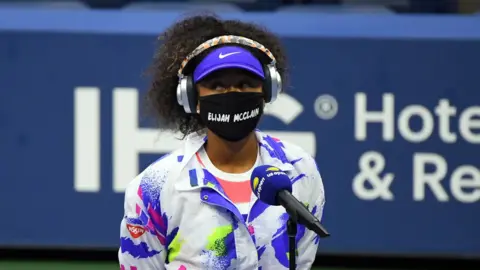 Reuters
ReutersElijah McClain was a 23-year-old black man who died in police custody in Aurora, a suburb of Denver, Colorado, on 24 August 2019.
He was walking, unarmed, when he was stopped by three white police officers. A district attorney report later said there had been an emergency call about a "suspicious person" matching his description.
There was a struggle as the officers tried to search him for a weapon. On body cam footage, Mr McClain can be heard saying: "I'm an introvert, please respect my boundaries that I am speaking."
One of the officers then says, "he is going for your gun" - at which point they wrestle him to the ground and put him in a chokehold.
The report says Mr McClain lost consciousness, was released from the chokehold and began to struggle again.
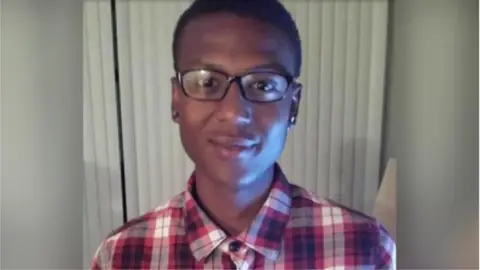 CBS / Mari Newman
CBS / Mari NewmanThe officers called for assistance, with firefighters and an ambulance responding. A fire medic injected Mr McClain with 500mg of the drug ketamine to sedate him.
Mr McClain was then put in "soft restraints" on a stretcher and put inside the ambulance. The medic who had administered the drug then noticed that Mr McClain's chest "was not rising on its own, and he did not have a pulse". He was declared brain dead on 27 August.
Mr McClain's family allege that the officers used excessive force for about 15 minutes as Mr McClain vomited, begged for them to stop and repeatedly told them he could not breathe. The officers also threatened to set a police dog on him, the family said.
Immediately after the incident, the three officers involved were placed on paid administrative leave. Three months later, prosecutors announced that they would not bring charges against the officers, and they then returned to normal duty.
In June this year, the officers were reassigned to "non-enforcement duties".
Ahmaud Arbery
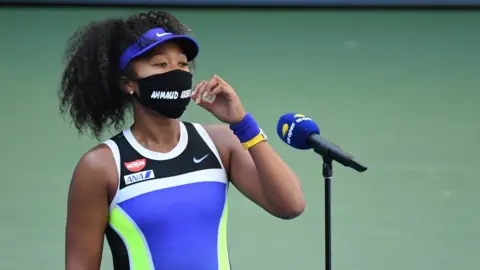 Reuters
ReutersAhmaud Arbery, 25, was jogging in Brunswick, Georgia, on 23 February when he was shot dead by two white men - a father and son.
In the moments before the fatal confrontation, Gregory McMichael, 64, and Travis, 34, armed themselves with a pistol and shotgun and pursued Mr Arbery in a pickup truck in Brunswick's Satilla Shores neighbourhood.
Gregory McMichael later told police he thought Mr Arbery looked like the suspect in a series of local break-ins.
A 36-second video shot by another man, William Bryan, leaked online on 5 May, generating a nationwide outcry that was swiftly followed by murder charges. Mr Bryan filmed it from his vehicle while he was driving behind Mr Arbery.
The clip appears to show Mr Arbery running down a tree-lined street as the McMichaels wait ahead for him in their vehicle.
A tussle follows between the younger McMichael and Mr Arbery, who then falls to the ground.
The three defendants were not charged until more than two months after Mr Arbery was killed. It was only when footage of the killing went viral that state police began investigating.
Travis McMichael, his son Greg, and William Bryan were indicted by Glynn County's Grand Jury on charges including malice and felony murder. They have pleaded not guilty, and are awaiting trial.
In a message to Osaka, Mr Arbery's father, Marcus Arbery Sr, said: "Thank you for the support of my family and God bless you for what you're doing and you supporting our family with my son. My family really, really appreciates that and God bless you."
Trayvon Martin
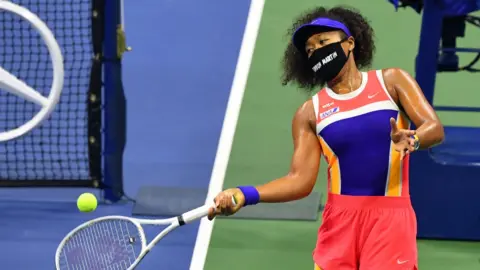 Reuters
ReutersThe killing of Trayvon Martin in Sanford, Florida, in 2012 - and the acquittal of the man who killed him - sparked the birth of Black Lives Matter.
Trayvon Martin, 17, had just been to the shop to buy some Skittles and a soft drink when neighbourhood watch volunteer George Zimmerman spotted him.
Believing the unarmed teenager was up to no good, Mr Zimmerman tackled him.
Nobody witnessed what happened between them but a neighbour's call to the emergency services picked up cries for help, followed by the fatal gunshot.
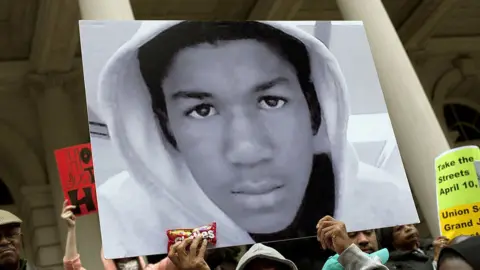 Getty Images
Getty ImagesMr Zimmerman's lawyer maintained that his client had been viciously assaulted by Martin. Gun laws in the US allow those who own firearms to shoot somebody if they feel they're in danger of being killed or seriously injured.
Because of this, Florida police didn't arrest Mr Zimmerman for six weeks after the shooting, provoking mass rallies in Florida and throughout the US.
US law allowed him to say he shot Trayvon in self-defence but the teenager's family and friends always insisted it was murder.
Martin's mother, Sybrina Fulton, said in a message to Osaka: "I just want to say thank you to Naomi Osaka for representing Trayvon Martin on your customized masks, and also for Ahmaud Arbery and Breonna Taylor.
"We thank you from the bottom of our hearts. Continue to do well. Continue to kick butt at the US Open."
George Floyd
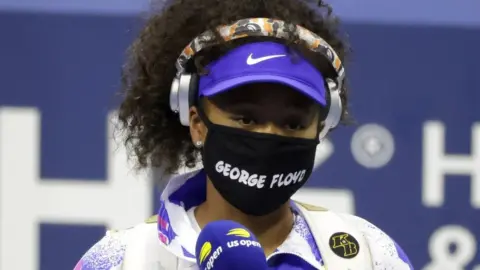 EPA
EPAThe killing of George Floyd reignited the Black Lives Matter movement this year, sparking what is believed to be the most widespread civil rights protest movement in US history.
Mr Floyd, 46, was stopped by police on 25 May in Minneapolis.
Officers were investigating the purchase of cigarettes with counterfeit money.
Footage, which was later widely shared online, showed Mr Floyd's arrest - during which an officer pinned him to the ground.
A white police officer, Derek Chauvin, was seen kneeling on his neck for almost nine minutes. Mr Floyd was heard repeatedly pleading with him to stop, saying: "I can't breathe."
He was pronounced dead in hospital.
As the footage spread globally, protests erupted in Minneapolis - the first of a summer of Black Lives Matter demonstrations across the world.
The four officers involved in his arrest were fired the following day, and later charged over his killing. They are expected to stand trial next year.
All images copyright
